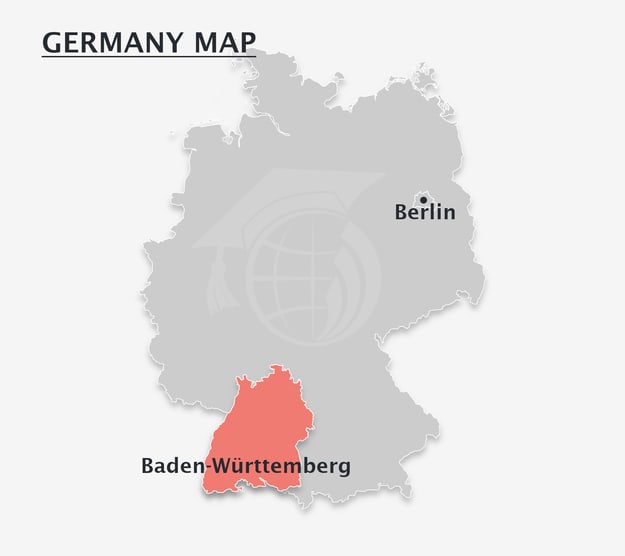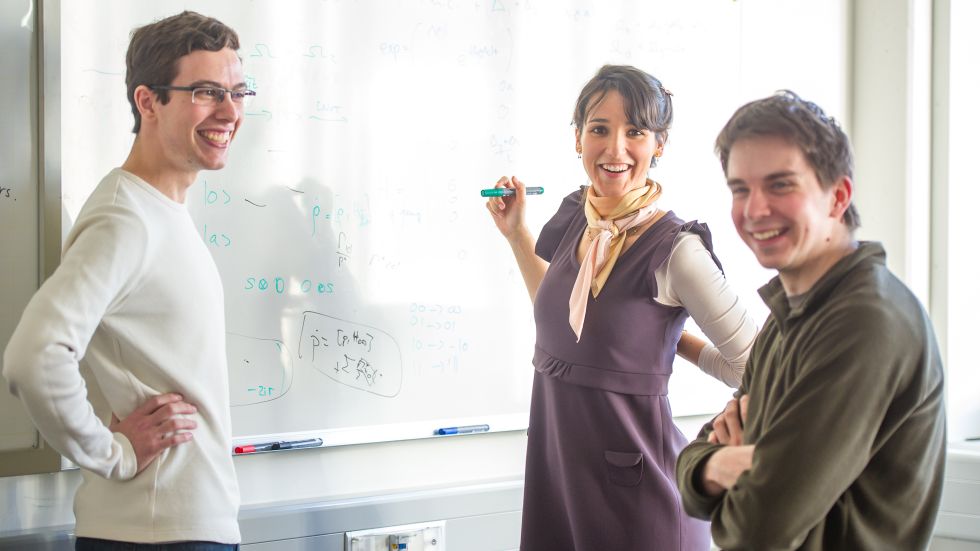- Top Colleges
- Top Courses
- Entrance Exams
- Admission 2024
- Study Abroad
- Study in Canada
- Study in UK
- Study in USA
- Study in Australia
- Study in Germany
- IELTS Material
- Scholarships
- Sarkari Exam
- Visual Stories
- College Compare
- Write a review
- Login/ Register
- Login / Register

List of Free Phd Programs In Germany
Mar 4, 2024 | 5 min read
Free PhD programs in Germany are offered at public universities to all students regardless of their nationality, for up to the standard length of a PhD (3 years).

International students looking for free PhD programs in Germany can check out public universities in Germany that offer free PhD programs to all students regardless of their nationality, for up to the standard length of a PhD (3 years). PhD programs are free also in the state of Baden-Württemberg where tuition fees were reintroduced for non-EU students in 2017.
Germany is one of the most popular study abroad destinations and is home to around 3,600 international graduates completing their doctorate every year. Having first introduced the PhD in the 19th century, German universities and specialist research centres continue to offer innovative, tuition-free, postgraduate programs in various specializations to students from all over the world.
Table of Contents
Why Study a PhD in Germany?
Types of free phd programs in germany, top universities for free phd programs in germany, eligibility requirements for free phd programs in germany, how to apply for free phd programs in germany, cost to study free phd programs in germany, scholarships for free phd programs in germany.
Germany has a global reputation as a world leader in technology innovation and research. It also has a robust economy and an attractive quality of life and is particularly renowned in fields such as engineering and manufacturing. Some reasons to study a PhD in Germany include:
- Several German universities have a strong international reputation of which 46 are ranked within the top 1000 in the world in the QS World University Rankings 2020
- Germany offers a high standard of living and welcomes international students with low costs of study and good funding opportunities
- PhD in Germany is usually tuition-free and more than a quarter of doctoral candidates in Germany receive public funding
- The German higher education system is also world-class that has produced some of history’s most formidable thinkers such as theoretical physicist Albert Einstein
There are two types of free PhD programs in Germany depending on their structure and their provider. More detailed information on each type of PhD in Germany can be found below:
Individual Doctorate: This traditional PhD program in Germany is the most popular where students produce their thesis or dissertation under the supervision of a professor, but will mostly be working independently. The duration of this doctoral program varies but usually takes between 3-5 years.
The individual doctorate is known for being flexible but also demands a high amount of personal initiative and responsibility. One can not only obtain a PhD degree by conducting research work at a university but also by completing a project at a non-university research organization or at a German company in the industrial sector.
Structured PhD Programs: These free PhD programs in Germany involves a group of doctoral students being guided by a group of supervisors. Over 600 programs are available for international students with English as the language of instruction.
The structured PhD programs differ from the individual doctorate programs as the research proposals of the students have to fit in with existing PhD programs and cannot be freely structured to suit the individual research project. Students are also required to attend lectures and seminars, and will normally have a mentor.
Several universities in Germany are ranked globally for their PhD programs by various ranking organisations such as Times Higher Education, QS Rankings, and more. Listed below are some of the top universities for free PhD programs in Germany for international students:
- Technical University of Munich
- Heidelberg University
- Humboldt University of Berlin
- Karlsruhe Institute of Technology
- University of Goettingen
- University of Freiburg
- Free University of Berlin
- RWTH Aachen University
The eligibility criteria for free PhD programs in Germany vary based on the university and chosen program. In general, students need to have a good higher education degree which is equivalent to a German master’s degree. Find below the other admission requirements for enrolling in free PhD programs in Germany:
- An entrance exam and interview is needed to enrol extremely well-qualified international applicants with a bachelor’s degree to a doctoral degree program in Germany via a fast-track program
- Students applying for a PhD in English need to prove their English language proficiency with an English language proficiency test such as IELTS or TOEFL
- Candidates studying or submitting their PhD in German need to prove their proficiency in the language with a test such as the DSH or TestDaF
Documents Required
- Master’s degree from a recognized institution
- Proof of language proficiency (English/ German)
- Motivation letter
- Work experience
The application process differs for admission to an individual doctoral program and a structured doctoral program. Students applying for a structured PhD program should apply directly to the chosen university. The steps below explain the procedure to be followed for admission to an individual doctorate program in Germany:
- Applicants should firstly find a suitable professor who is willing to be their supervisor
- The supervisor can be found through contacts from your previous university or by searching for institutes and research centres or teams related to your area of interest
- The next step after finding a supervisor is to get the confirmation of eligibility as a doctoral candidate from the responsible department or doctoral committee
- For this, one must complete an application that includes a statement from your doctoral supervisor, certified copies of certificates, proof of recognition of your qualifications from the Dean’s office, academic references and the university degree
- The application should also include an English or German language test result, if applicable
Doctoral programs at public universities in Germany are free for all students irrespective of their nationality for up to the standard length of a PhD (3 years). Students may be required to pay the fees if the doctoral degree exceeds this duration.
Students pursuing free PhD programs in Germany are required to make a semester contribution of between €150 to €200 (~US$175-230) for administration and other costs like all other students. The main expenses for free PhD programs in Germany are living expenses.
International students applying for a student visa for Germany need to have access to a minimum of €10,236 (~US$11,266) per year in a blocked account. This amount covers the living expenses, which include rent, food, clothing, transportation, working materials, recreation and other costs.
Most doctoral students in Germany work on a paid research project or receive a scholarship. Students willing to obtain a scholarship to cover their living expenses in Germany can find various funding options on the official website of the university they wish to study at.
Students pursuing free PhD programs in Germany can also take a part-time job to supplement their funding, either within the university or outside. Full-time students from outside the EU are limited to working up to 120 full days or 240 half days per year before applying for a work permit. One can also receive graduate assistantships and fellowships from their university as well as public funding provided by the German government.
POST YOUR COMMENT
Get Free Scholarship worth 25000 INR
- Plan Your Studies
- Study Programs
- Universities
- Requirements
- Living in Germany
- Accommodation
- Statistics & News

How to Apply for a PhD in Germany: Programs, Funding, & FAQs
If you’re considering advancing your academic journey with a PhD and have a passion for conducting research in your field, Germany could be an excellent destination for you. With its top-tier universities, exciting research opportunities, financial support, and diverse culture, Germany stands out as an excellent choice for PhD studies.
These are the main steps to doing a PhD in Germany:
Find a PhD Program and a Supervisor
- Decide Between Individual and Structured PhD Programs
- Meet All Requirements & Prepare Your Application
Apply for Doctoral Studies
Secure funding, get a student visa or resident permit, arrive in germany and begin your phd program, why pursue a phd in germany.
Here are some compelling reasons to pursue a PhD in Germany:
- Top universities. Germany boasts four universities ranked in the top 100 globally, offering access to world-class education and research facilities.
- International student community. Germany welcomes a diverse and thriving international student community, with over 458,210 international students studying across the country.
- Abundant research institutions. Germany’s 1,000+ publicly funded research institutions, spanning universities, applied sciences, research institutes, businesses, and government bodies, offer countless opportunities for collaboration and networking.
- Investment in research and development. Germany’s commitment to research and development is evident through its increasing expenditure, which reached a record high of 112.6 billion euros in 2021.
- Strong economy. Germany is known for its robust and stable economy, offering potential career opportunities in academia, industry, and research sectors after completing your PhD.
How to Apply for a PhD in Germany
Below, you will find all the steps you need to take, from discovering your perfect program to submitting your application and commencing your PhD adventure in Germany.
To start your PhD in Germany, define your research focus by considering your interests and academic background. Explore resources, attend conferences, and connect with professors. Use online sources, engage with academic communities, and seek advice from current PhD students for insights into the research scene.
If you’re already clear about your research direction, it’s time to search for suitable programs. The German Academic Exchange Service (DAAD) provides a comprehensive database of current opportunities, which you can explore at the DAAD PhD Database . Additionally, consider researching universities in Germany individually to understand what each institution offers in terms of research and programs.

Study at GISMA University of Applied Sciences
Be one step ahead with a globally recognised college in Germany!
You will also have to find a supervisor. One way to do so is by visiting university websites to find faculty directories with profiles of professors and their research interests. Contact professors whose work aligns with your research interests, express your interest and inquire about supervision opportunities.
> You can search PhD programs using the GERiT database , which features over 31,000 research institutions.
Types of PhD Programs in Germany
Before you start searching for a PhD program, it’s essential to understand that in Germany, there are two different paths you can take when pursuing a PhD, each with its own set of advantages and opportunities.
Individual PhD Programs
An individual doctorate program is considered the more common and traditional PhD route in Germany. It is a flexible and self-directed path to earning a doctoral degree, particularly in fields like humanities and social sciences. You take the initiative to find a supervisor (called “Doktorvater” or “Doktormutter”) for your research project and often suggest your research topic.
There’s no fixed curriculum, giving you the freedom to set your research timeline and choose coursework. This approach requires self-discipline and active networking, including participation in doctoral candidate meetings and research events.
Structured PhD Programs
Structured PhD programs in Germany offer a clear path to a PhD degree, typically lasting three to five years. Unlike individual doctorate studies, they include a curriculum, research proposal submission that has to fit an existing program, and a set timeline for coursework and research.
Candidates benefit from advisor supervision and are encouraged to collaborate across disciplines, making structured programs ideal if you’re seeking a guided and comprehensive doctoral experience.
Ensure You Meet All Requirements & Prepare the Application
The requirements and application documents for a PhD in Germany can vary depending on your chosen institution and research area. However, as a general guideline, you should prepare the following:
- Academic degree recognized in Germany. Typically, you’ll need a master’s degree or a German state examination (Staatsexamen) to qualify for a PhD program.
- Copy of master’s thesis. Provide a copy of your master’s thesis, showcasing your research skills and the depth of your academic work.
- Research proposal. Craft a clear and comprehensive research proposal outlining your intended research topic, objectives, methodology, and significance.
- Statement of purpose. Write a statement of purpose explaining why you wish to pursue a PhD in your chosen field, your academic and career goals, and how this program aligns with your aspirations.
- Curriculum Vitae (CV). Prepare a detailed CV highlighting your academic achievements, research experience, relevant coursework, publications, and any other qualifications.
- Proof of language proficiency. Depending on the language of instruction (usually German or English), you may have to provide proof of language proficiency. You can do this with certificates like TestDaF, DSH, TOEFL, IELTS, or proof of previous studies in the language.
- Academic references. You may need to provide contact information or recommendation letters from professors or academic advisors confirming your academic abilities and research potential.
- Predoctoral examination. Some programs may require you to pass a predoctoral examination as part of the application process.
Once you’ve found a suitable PhD program and a mentor, and your academic qualifications are recognized in Germany, you can start your application. Depending on the university or research institute, you can apply online or by post, so it’s essential to check their specific requirements. Keep in mind that admission committees are selective and may conduct interviews to admit the best candidates.
Securing funding is a crucial step when preparing for a PhD in Germany. To meet visa requirements and stay in the country, you must demonstrate access to a minimum of €934 per month, totaling €11,208 annually. This proof can be provided through an admission agreement or relevant contract, or you can open a blocked account with individual funds.
There are various ways to financially support yourself while pursuing a PhD in Germany:
- PhD scholarships. DAAD offers the highest number of doctoral scholarships. PhD students get an average monthly stipend of €1,139.
- Paid PhD positions. Many universities and research institutions offer paid PhD positions in Germany. You will have a contract and work on specific research projects while receiving a salary.
- Research associate positions. You can also work as a research associate in a university, research institution, or company and receive a salary as compensation.
- Part-time jobs. Some PhD students/researchers work part-time jobs that are not related to their studies to secure additional income.
> Read more about the costs associated with studying in Germany.
> Explore scholarship opportunities.
Once your acceptance into the PhD program is confirmed by the university or institution, you can begin the process of applying for a student visa or residence permit. The PhD visa or permit requirements for Germany can vary depending on your nationality and individual circumstances:
Visa Requirements
Citizens of the EU, the European Economic Area (EEA), and Switzerland do not need any special permit or visa to pursue a PhD in Germany. They can research and work with just a valid passport or ID card.
For international researchers who are not citizens of the EU, EEA, or Switzerland, a visa will be required to work as a researcher in Germany.
The type of visa you need depends on your specific situation:
- Study visa. If you’re pursuing a full-time doctoral program, you may apply for a student visa.
- Research visa. If your focus is on research and you have a formal affiliation with a research institution in Germany, you can apply for a research visa.
- EU Blue Card. If your PhD offer includes a gross annual salary of at least €45,300 (or €41,041.80 in certain professions), you may be eligible for an EU Blue Card, which is a special residence title for international academics.
Residence Permit Requirements
Once you arrive in Germany, you’ll need to apply for a residence permit based on the visa you have:
- Study permit. If you’re accepted into a PhD program at a German university, you can get a study-based residence permit for up to two years, extendable.
- Research permit. If you’re a researcher with the right qualifications for doctoral programs, you can get a research permit for Germany. This requires a contract with a research institution for your project.
- EU Blue Card. You may be eligible for the EU Blue Card, which is for foreign academics and qualified workers in Germany. To get it through a PhD offer, your salary should be at least €45,300 per year, or €41,041.80 for certain bottleneck professions .
*Note that nationals of certain countries , including the United States, Australia, Israel, Japan, and Korea, who are not required to obtain a visa, must still apply for a residence permit.
> For more specific information tailored to your situation, we recommend contacting the German embassy or consulate in your home country. You can also use this visa navigator.
Arriving in Germany and commencing your PhD program is an exciting step, but there are certain formalities you need to take care of. The international office at the university or a representative can guide you, however here are the main things to take care of once you’re in the country:
Register Your Residence
Shortly after your arrival, you must register your residence at the local registration office (Einwohnermeldeamt or Bürgeramt). This is mandatory, and you typically have a window of two weeks to complete this process.
Obtain Health Insurance
Everyone in Germany, including international PhD students, is obligated by law to have health insurance coverage . The type of health insurance you are eligible for depends on the source of your funding:
- Doctoral candidates with an employment contract are typically insured automatically with a state-regulated health insurance provider (Gesetzliche Krankenversicherung -GKV)
- Doctoral candidates without an employment contract (with a fellowship or private funding) may choose between:
- Voluntary health insurance coverage with a state-regulated provider.
- Coverage with a private health insurance company.
Some exceptions allow you to retain your insurance from your home country, such as students from a European Union (EU) country or other countries with social security agreements with Germany.
Open a Bank Account
It’s advisable to open a German bank account as soon as possible. Many financial transactions in Germany, including receiving your stipend or salary, are typically done through a German bank account.
Enrollment at University
If your PhD program requires enrollment at a university, you’ll need to complete this step. Submit the necessary documents to the university’s enrollment office, which may include your admission letter, passport, proof of health insurance, and proof of financial means.
Frequently Asked Questions (FAQs)
There’s a lot to think about when you’re considering pursuing a PhD, especially if it’s in a foreign country. We’re sure you’ve got more questions, and we’re here to help.
What Is the Duration of a PhD Program in Germany?
In general, a PhD program in Germany typically lasts between three to six years.
The duration of a PhD program in Germany can vary depending on several factors, including the university, the subject area, and individual progress.
Are PhD Programs in Germany Tuition-Free?
Most PhD programs in Germany are tuition-free, at least for the first six semesters. However, if you are enrolled at a university, you will need to cover a semester fee. This can vary depending on the university but usually falls within the range of €100 to €350.
Is Knowing German Mandatory to Pursue a PhD in Germany?
Knowing German is not always mandatory to pursue a PhD in Germany. Many German universities offer PhD programs in English, especially in fields like science, engineering, and the humanities. In such programs, you can write your thesis and communicate with professors and peers in English.
However, language requirements differ by university and department. If your program is in German, you might need to prove your proficiency. Knowing German can also be helpful for daily life and integration if you’re living in Germany.
Will I Get a PhD Salary in Germany?
PhD candidates in Germany, whether affiliated with universities, research institutions, or companies collaborating with them, typically receive financial support in the form of a salary or grant.
The majority of doctoral positions are structured under the TV-L (Tarifvertrag im Öffentlichen Dienst) salary scale, often falling within the TV-L 13 category, with a salary range spanning from €4,188 (Tier 1) to €6,037 (Tier 6).
Salaries are typically determined based on a wage agreement that specifies the contract tier (Stufe) and working hours (percentage-based). Many entry-level PhD students start with tier 1 contracts that are not full-time. For example, if your contract places you in Pay Group E-13 Tier 1 of the TV-L and you work at 75% capacity, your monthly gross salary will be €3,141.
Can I Work While Pursuing a PhD in Germany?
It’s generally allowed for PhD students in Germany to have part-time jobs to cover living expenses. However, the rules and expectations can vary depending on your supervisor, field of study, and specific circumstances.
While part-time work is an option, keep in mind that pursuing a PhD can be quite demanding, often requiring long hours of research and study. It’s essential to find the right balance between work and your academic commitments. Additionally, make sure to be aware of any legal and contractual obligations related to your employment while studying for your PhD.
What Is the Process for Defending a PhD Thesis in Germany?
In Germany, defending your PhD thesis involves several steps. You start by submitting your thesis and necessary documents, making sure they meet all the formal requirements. A commission is formed, and you may have the opportunity to suggest reviewers.
Then, you will have to prepare and undergo an oral defense, which can be either public or private and typically lasts between 30 minutes to 2 hours. During this, you present your research and discuss it with the committee.
The outcome of this discussion determines your final grade, which you receive after the defense. If everything goes well, you’re granted the Ph.D. title and have about two years to publish your dissertation.
What Are the Career Prospects After Completing a PhD in Germany?
After completing a PhD in Germany, career prospects are promising. Graduates often find opportunities in academia as professors or researchers or in various industries, including technology, healthcare, and finance. Germany’s strong economy and research-oriented environment make it an attractive place for career development.
Join 262,114 students interested in studying in Germany

Download The Guide

Quick Links
8 Steps to Study in Germany How To Apply To Study in Germany German Education System Requirements Universities in Germany International Programmes Financing Your Studies German Student Visa German Health Insurance Germany Blocked Account Learn German Guide German Cities Cost of Living
Latest News and Statistics
Over 3,800 university students in germany were under 18 in 2022, higher education in germany: key trends & statistics, german universities’ spending €3.3 billion higher in 2022, daad allocates €120 million for recruiting international students as highly skilled workers in germany, int’l students in germany to enjoy more employment freedoms under new immigration law.
- Privacy Policy
- Cookie Policy
How to apply for a PhD in Germany – free online course offered by DAAD

Germany's DAAD offers a free online course ' How to apply for a PhD in Germany'.
The total learning time will take approximately six to nine hours.
You will learn more about the following aspects of doing a PhD in Germany:
- where to find a PhD position,
- application requirements and how to write a good application,
- characteristics of the German research landscape,
- and how to convince a supervisor of your project.
Details and Registration.
- Value Package
- Blocked Account
- Health Insurance
- Bank Account
- Study Finder
- Study Eligibility Checker
- Accommodation
- Learn German
What We Offer
- Living in Germany
- Studying in Germany
- Working in Germany
About Germany
- German Cities
- Tourism in Germany
- German Culture
- Visa for Germany
- Costs of Living in Germany
- Finance in Germany
- Health Insurance in Germany
- Driving in Germany
- Renting in Germany
- German Universities
- Free Studies in Germany
- German Education System
- Germany vs. other Study Destination
- German Degrees
- Application Process to Study in Germany
- Financing your Studies in Germany
- Best Universities in Germany
- German Business Culture
- Best Cities in Germany for Expats
- After your Bachelor's in Germany
- After your Master's in Germany
- About Expatrio
- Partner log in
- Partner Log-in
PhD in Germany [Complete Guide]

Few achievements in life match the feeling of being awarded a PhD. Doctorates represent the pinnacle of academic achievement, and require years of diligent study.
The rewards, however, are great. Not only does a Ph.D. give you bragging rights at cocktail parties, but it also provides excellent job prospects and earning potential. But what if you want to study for a PhD outside of your home country?
Germany is an increasingly popular destination for international students, offering high-quality education and research facilities at a fraction of the cost of studying in the US or UK. Germany offers and takes research extremely seriously, and is one of the world's most popular places to study for a PhD or higher education.
But what kinds of PhDs are available, how much do they cost, and how do students apply? Let's find out.
General information
Germany is widely seen as one of the best places to apply for a PhD worldwide
The country offers excellent education and research facilities as well as competitive funding opportunities for doctoral students.
There are different types of Ph.D. programs in Germany. That's no surprise, as Germany invented the elite academic qualification in the 19th century . German PhDs cover subjects as diverse as history, linguistics, and philosophy, or chemistry, molecular biology, earth sciences, and computer science. Most lower level degree subjects can be extended to PhD level if the student desires.
How can I get a PhD in Germany?
There are two main ways to complete a PhD in Germany. Most commonly, students form a working relationship with a specific Doktorvater or Doktormutter (or "supervisor" in English). They then work on a tightly focused research task for the duration of their studies. The fruits of their university research are then presented as a "Doctorate" ( Doktorarbeit ), which tends to resemble a medium-length book.
In some cases, "Structured" PHDs are available . These resemble taught Masters degrees, but still have a strong research element. They may also focus on work placements.
How long does it take to get a PhD in Germany?
Generally speaking, a standard research-oriented German doctorate can be obtained within 4-6 years . This depends on the speed of work and personal factors such as having children. Structured doctorates can often be completed in just 3 years , but this varies from course to course.
International PhD Programs
Germany welcomes international students to study at PhD level
Many programs offer specialist assistance and course structures for overseas students.
DAAD (the German Academic Exchange Service) brings together grants for international students at leading German universities . It's the best place to start hunting for scholarships to help fund your studies .
Is a PhD in Germany free?
PhDs at German universities are usually available free of charge for international students , but living costs aren't covered. However, scholarships can cover (most) living costs. DAAD grants will average around €1,200 per month , and additional funding sources may be available.
A group of prominent universities has also created a funding scheme called StipendumPlus , which also distributes grants. Between them, finding financial help should be possible.
Do PhD students get paid in Germany?
It's not routine for international students to be paid for their work , but it is definitely possible to find paid research posts. Enquire with your supervisor, and you may find that paid jobs are available to supplement your income.
How to find your PhD Position
Finding the right PhD is essential
It's a huge investment of both finances and time , and could change the course of your life. So here are some useful tips to remember.
Take time to find a supervisor you want to work with. Balance their academic record with the resources of the university, and have a chat with them if possible. You need to be able to work with them on a daily basis.
- Searching for doctorate programs has been made much easier by databases like DAAD . Use them to assess every option.
- Consult university rankings to avoid poor-quality teaching.
- Check for services like career advice and travel grants. As a PhD researcher, you may need to travel worldwide, and this can be expensive.
- Ask about work opportunities as well. Research posts at your university are the best way to add some extra income, while gaining relevant experience.
Requirements and Application
Before you can commence doctorate studies in Germany, you'll need to complete an application process
If you want to study a traditional PhD, applications must be carried out via your prospective supervisor .
When you contact the supervisor and they agree to work with you, they will forward your request to the relevant faculty . The department will then request:
- A statement from your supervisor
- Proof of your academic qualification
- 1-2 academic references
- Proof of language proficiency
- A valid student visa and health insurance
Structured PhDs don't require students to go through a supervisor. In those cases, applications are made via the faculty, and will usually be carried out via online portals.
To study a PhD, requirements generally demand a Masters degree (8 semesters of university education), as well as English and German proficiency to a high level.
IELTS English certificates , and TestDaf German courses are advisable for all doctoral candidates, even if they have studied those languages in the past.
PhDs are a huge investment of both finances and time, so it's important to do your research before choosing a supervisor and program. Make sure to consult university rankings and databases like DAAD when making your decision. Once you've been accepted into a program, make sure to apply for scholarships and grants to help cover your living costs.
Finally, remember to ask about work opportunities as well – research posts are a great way to gain relevant experience and supplement your income.
Find Your Perfect Match
Search by city, major, or field of study and find your dream study program in Germany.
Exchange Programs in Germany [Complete Guide]
Best German Universities for Medicine
Germany or UK to Study: Which is Best for Students?
This might also be of interest to you

Pre-Studies & Studienkolleg in Germany
Germans are huge believers in preparation, and that's especially the case in the higher education sector. German universities welcome international...

Few achievements in life match the feeling of being awarded a PhD. Doctorates represent the pinnacle of academic achievement, and require years of...

German Language Course Degrees [Guide]
Learning German is an essential step for almost everyone who makes their home in the country, and it can also be one of the most enjoyable...

Master's Degree in Germany [Guide]
Germans value skills above almost everything else, and the nation's universities offer a vast range of subjects, in M.A., M.Sc., and M.Eng. formats.
![study phd for free in germany MBBS in Germany [Complete guide]](https://8668267.fs1.hubspotusercontent-na1.net/hub/8668267/hubfs/Expatrio%20Hatch%20Child%20-%20Theme/Blog%20Graphics/Studying%20in%20Germany/mbbs%20in%20germany.webp?width=374&name=mbbs%20in%20germany.webp)
MBBS in Germany [Complete guide]
If you want to obtain a "Bachelor of Medicine, Bachelor of Surgery" (MBBS) qualification, studying abroad is often the best route to choose. Germany...

Best English-taught Master Programs in Germany
Germany is renowned for its high-quality education, and many of its universities rank among the best in the world. Additionally, studying in Germany...

Tuition-free Universities in Germany taught in English
- Check out our Video Course (64 min.)
- 180+ Universities offer English programs for free
- Public Universities in Germany are free
- Special case: Baden-Württemberg
- Study for free - even at Top Universities
- Private Universities
- No German needed
- List of tuition-free universities in Germany with English programs
Video Course
Get Accepted into Your Dream German University — with the Perfect Letter of Motivation!

I’m sure you've heard by now that Germany has a multitude of tuition-free study programs which are available not just only to German citizens, not just only for EU citizens, but also for all international students! Sounds too good to be true, right? Well, wait, what if you don't speak German?! Great, looks like you'll have to miss out. Wrong!
Germany's public universities have tuition-free study programs that are in English! You don't have to be fluent or even have ever studied German to come study in Germany.
International students have 240 universities in Germany with more than 2,000 English-language bachelor's and master's programs to choose from!
It can be daunting to get up and move to a different country with a completely different culture and language, but having your study program taught in a foreign language shouldn't be another added stress, especially if you are a beginner or have no German skills. Having the comfort of studying in a more familiar language eases the transition of going to a new place for your studies. We understand that searching for the perfect university can be overwhelming, so let us break down the many options you have available to you to study in Germany, in a language you're comfortable with, for FREE!
Check out our Video Course (64 min.) on "How to write a Letter of Motivation"

22 videos plus checklist and template
More than 180 German Universities offer English degree programs with no tuition fee
You can study in Germany using the English language
If you have been honing your German skills for some time and are not limiting your search to English-language programs, then you have more options open to you as Germany has more than 400 universities in total! There is a great range of universities from large universities to smaller ones, should you be looking for a more one-on-one style approach to learning with your academic adviser. However, for those of us who haven’t quite mastered (or even started to learn) the wonderful and complex German language, there is no need to worry because there is something for you in Germany!
Over 200 universities in Germany offer English-language study programs to give international students opportunities to pursue a postgraduate degree though they don't speak German. The English degree programs available all have English-speaking faculty and staff as well. A variety of study programs are available to you, from film studies to political science to chemistry! Universities in Germany are aware that being able to study in a German-language program requires a lot of work and is near impossible for international students to achieve outside of Europe. So don't be discouraged in thinking you need to be fluent in German to study at these great programs. Additionally, once here, there are German-language courses available to you which you can take alongside your studies.
Public Universities in Germany are free for international students
In Germany, public universities are tuition-free, and not just for German or EU citizens! You don't have to have ever been to Germany or speak German to apply to universities in Germany. International students are welcome and encouraged to apply to universities in Germany, and with so many tuition-free English programs, there is a lot to choose from.
Why would Germany do such a crazy thing you ask?
Well, the general idea is that international students come to study in Germany and integrate into society here during their studies, and upon graduation, they join the German workforce, creating cultural bridges between their home country and Germany. Since Germany has the strongest economy in the EU, it's safe to say that they might be onto something!

Further Reading
Exception: Professional Degrees at Public Universities
On the other hand, there are study programs (approx. 15-20%) which require tuition, though they are at public universities which include:
most of the professional or executive master's degrees , e.g. LL.M. (Master of Law), MBA (Master of Business Administration) or MPA (Master of Public Administration),
some very specialized study programs , such as those which include laboratory components or highly specialized technology as equipment may counter into an extra cost,
some international degree programs , like double degree programs that collaborate with other universities outside of Germany or joint master's programs (e.g. Erasmus Mundus).
However, this is not a specialized fee directed at international students, but rather a general fee for ALL students who wish to apply to these specialized study programs.
Our helpful StudyFinder can filter these programs out for you so that you can make sure you find the perfect program for you.
- If you are interested in checking out some of these specialized degree programs, you can use special filters, e.g. for MBA or LL.M. programs or double-degrees.
- Otherwise, just keep your eye on those tuition-free programs which are always offered at public universities by filtering for "no tuition fees".
Special case for Non-EU students: Baden-Württemberg
There is a special case which you should keep in mind on the hunt for your university program in Germany. In the state of Baden-Württemberg, located in the Southwest region of Germany, there is a small tuition fee (1,500 €/semester) for students coming from outside of the EU.
If your top-choice universities are in Baden-Württemberg, the most popular cities being
- Stuttgart (being the capital),
- Heidelberg ,
- Freiburg im Breisgau ,
- Karlsruhe ,
- and Konstanz (Constance) ,
don't let this non-EU tuition rule discourage you.
Many universities offer reduced tuition or tuition waivers to non-EU students who come from certain countries.
For more information on this non-EU tuition fee, refer to the Baden-Württemberg Ministry of Science, Research, and Art's page which discusses this tuition-fee in detail.

Baden-Württemberg is the only federal state in Germany that charges general tuition-fees for Non-EU students
Study for free in Germany - even at Top Universities
Front of the Humboldt University in Berlin.
© Christian Wolf . Type of license: CC BY-SA 3.0 DE.
In Germany, all public higher education institutions are free, even the highest ranked universities in the country! Unlike other countries that charge crazy tuition fees due to the high demand of students who wish to attend them, the top-ranked German universities charge the same tuition price as the rest: nothing. That's right, you don't have to limit your university search just because of tuition prices since even the most prestigious German Universities are free, e.g.
Freie Universität Berlin (Free University of Berlin),
Heidelberg University (Ruprecht-Karls-Universität Heidelberg) *,
Humboldt-Universität zu Berlin (Humboldt University in Berlin) ,
LMU - Ludwig-Maximilians-Universität München (University of Munich) ,
RWTH Aachen University (Rheinisch-Westfälische Technische Hochschule Aachen) ,
Technical University of Munich (Technische Universität München) ,
University of Bonn (Rheinische Friedrich-Wilhelms-Universität Bonn) ,
University of Freiburg (Albert-Ludwigs-Universität Freiburg) *, *except for Non-EU students (cf. "Special case: Baden-Württemberg").
While these are some of the many top-ranked universities in Germany, there are also other institutions that are well-known and have great programs that also are public and therefore do not charge tuition fees.

Private Universities: moderate fees, great options
In addition to public universities, Germany has a vast selection of private universities with great study programs as well. Maybe you might have heard of one of these private Universities that offer degrees taught in English:
- Bucerius Law School ,
- Frankfurt School of Finance and Management ,
- Hochschule Fresenius - University of Applied Sciences ,
- IUBH University of Applied Sciences ,
- Jacobs University Bremen ,
- Kühne Logistics University ,
- WHU - Otto Beisheim School of Management ,
- Witten/Herdecke University ,
While private universities charge a tuition fee to their own discretion, the fees are still significantly lower (average of 5,000 € - 7,000 € per semester) than at private universities in other countries.
Private universities charge a tuition fee to all students, not just international students.
In spite of these fees, private institutions are still very popular in Germany and many students prefer to attend these, sometimes looking for a very specialized program or option for a smaller student size in courses. Whatever the reason may be, should you be interested in looking at the different private universities which Germany has to offer, click here to view the programs and institutions that our StudyFinder has for you.
No German needed - more than 2,100 Degree programs in English
So, you aren't fluent in German? No problem! There are more than enough study programs available in English for you to choose from. By now you know that studying in Germany doesn't mean studying in German. If you are pursuing a degree program abroad that is affordable and in a language you are comfortable learning in, then Germany is the place for you. The variety of English-language study programs available for international students ensures that there is a study program for everyone!
Additionally, these universities also have staff and faculty which speak English and can answer any questions you may have. This can be particularly useful throughout the application process. However, MyGermanUniversity can also fill you in on the ins and outs of applying to a university once you find your dream study program. Sign up for our email list where we send tips and information or join one of our weekly webinars to have your questions answered by one of our study counselors!
Summary Box
International students have more than 140 tuition-free universities in Germany that offer more than 1,200 English language degree programs with no tuition fees.
Public universities in Germany are tuition-free for ALL students, whether you're an EU citizen or not (except for the special case of Baden-Württemberg where Non-EU students must pay 1,500 € per semester).
For more specific questions, sign up for our email list where we send tips and information or join a weekly webinar to learn more about studying in Germany and to have your questions answered by one of our study counselors.
List of tuition-free universities in Germany with English degree programs
Aalen University
Program Fees: € 0 - € 1,500
M.A. (Master of Arts)
M.Sc. (Master of Science)
Academy of Fine Arts in Nuremberg
Program Fees: € 0
Albstadt-Sigmaringen University
Anhalt University of Applied Sciences
B.A. (Bachelor of Arts)
M.Eng. (Master of Engineering)
Ansbach University of Applied Sciences
Aschaffenburg University of Applied Sciences
B.Sc. (Bachelor of Science)
Augsburg University of Applied Sciences
Bard College Berlin
Barenboim-Said Akademie
B.Mus. (Bachelor of Music)
Bauhaus-Universität Weimar
M.F.A. (Master of Fine Arts)
← Prev page
Next Page →
More Articles

Master's Requirements in Germany

Uni-assist: A guide for international students (2024)

10 things you need to know about scholarships

How Much Does it Cost to Live in Germany?

Germany in University Rankings

DAAD Scholarships: Guide
Study in Germany for free: What you need to know

Author: Study.eu Team
Our multi-national team has done extensive research to provide you with detailed and correct information. The content is regularly checked and kept up-to-date.

You might be interested in this:

German Universities that offer free PhD with stipend

In Germany, it is common for PhD students to receive a stipend or scholarship to cover their living expenses while they are pursuing their degree. This means that many PhD programs in Germany are essentially free for students. However, it is worth noting that these stipends or scholarships are typically competitive and may not be available to all students.
Here are a few universities in Germany that offer free PhD programs:
- Technical University of Munich
- Ludwig Maximilian University of Munich
- Humboldt University of Berlin
- Free University of Berlin
- Goethe University Frankfurt
It is worth noting that these universities may have specific requirements or conditions that must be met in order to be eligible for a stipend or scholarship. For example, some programs may require that you have a strong academic record or that you have completed certain courses or exams.
Most Popular Universities
- Free University Of Berlin
- Max Planck Institute
- University Of Cologne
- Berlin University Of The Arts
- University Of Bonn
- Humboldt University Of Berlin
- University Of Kassel
- University Of Hamburg
- Heidelberg University
- Technical University Of Berlin
- University Of Freiburg
- Ludwig Maximilian University Of Munich
- Technical University Of Munich
- University Of Stuttgart
- University Of Duisburg-Essen
- IU International University Of Applied Sciences
- Goethe-Institut
- University Of Kiel
- University Of Bayreuth
- Munich Business School
- Berlin School Of Economics And Law
- Frankfurt School
- Ruhr University Bochum
Introduction to GMAT (Graduate Management Admissions Test)
Why Canada is popular destination for International students?
Leave A Reply
- courses Python
- Professional Exams
- Notes English Essays
- Internships
- Opportunities
- Mobile Apps
- Scholarships
- Citizenship
- Universities Review
Recent Blogs
ScholarshipsAds
Recent Updates
Sapienza university of rome scholarships 2024/2025 in italy, bucharest summer university 2024 in romania (fully funded), npu president scholarship 2024 in china (fully funded), university of cagliari is offering 98 funded phd positions in 2024 (study in italy), kazakhstan government - enic kazakhstan scholarships 2024 (fully funded), njsut silk road chinese government scholarships for non-chinese students, arqus european university talent scholarship fund 2024 (study free in europe), matsumae international fellowship 2025 in japan (fully funded), japan manga award 2024: an opportunity for international cartoon and manga artists, university of pavia italy announces 6 fully-funded cicops scholarships for 2025, caregiver continuing education: 7 ways to advance your career, london centre for nanotechnology announces phd positions for 2024, ontario tech university has 16 vacant postdoctoral and academic positions., 69 vacant postdoctoral and academic positions at arizona university, 41 faculty positions at toronto university, canada, bocconi university launches scholarship program for 2024 academic year.
- { expandedNavigation=true; activeIndex=0; }"> Research landscape
- { expandedNavigation=true; activeIndex=1; }"> Your goal
- { expandedNavigation=true; activeIndex=2; }"> Plan your stay
- { expandedNavigation=true; activeIndex=3; }"> Success stories
- { expandedNavigation=true; activeIndex=4; }"> Our service
- R&D policy framework
- Research infrastructure
- Research funding system
- Universities
- Universities of applied sciences
- Technical universities
- Top universities
- Fraunhofer-Gesellschaft
- Helmholtz Association
- Leibniz Association
- Max-Planck-Gesellschaft
- Academies of sciences and humanities
- Federal institutions
- State research institutions
- What is R&D in German business?
- Why is collaboration important?
- Which sectors carry out R&D?
- Which are the leading companies?
- How do German businesses compare internationally?
- How is the start-up scene set up?
- How do I start a career?
- Good reasons
Two ways to get your PhD
- Find your PhD position
- How to apply for a PhD
- Funding programmes
- Funding organisations
- Funding databases
- Job portals
- Career options & dual careers
- Funding & awards
- Potential employers
- Research fields
- Entry and residence
- German money-saving tips
- Cost of living
- Social insurance and health
- Bringing your family
- Information for your partner
- Support for families
- Finding a place to live
- Funding opportunities
- Recognition of professional qualifications
- Counselling
- Latest Thinking
- First-hand experiences from international researchers
- On-site consultation
- Our publications
- Research news
- Online talks
- Topics in focus
A doctorate is the highest academic degree that a university can award. In Germany, studying for a doctorate primarily means working intensely on a specific subject or research project for a long period of time. It typically takes five to six years to obtain a doctorate, though the length of time can vary.
How to obtain a PhD in Germany
If you decide to do a doctorate, you can choose between different forms of study. Depending on your discipline, research area, personal circumstances and formal qualifications, there are two different paths:
- Individual doctorate The individual doctorate is based on independent research carried out alone under the supervision of one professor. This is the traditional path followed by over three quarters of all doctoral students in Germany.
- Structured PhD programmes These programmes offer a form of study similar to that found in English-speaking countries. You will be supervised by a team and will attend courses, lectures and seminars together with other doctoral students. Normally, such programmes are publicly advertised and often feature grants or paid doctoral positions.
Individual doctorate

DAAD/Jan Zappner
The "traditional" or "individual" path to a PhD remains the most common in Germany. An individual doctorate involves a thesis or dissertation that is produced under the supervision of one professor .
This form of PhD study offers a great deal of flexibility , but also demands a high degree of personal initiative and responsibility . A professor supervises a PhD student, who works on his or her subject in consultation with the professor, but largely independently .
How long a traditional individual doctorate takes depends on your own time schedule – or on the duration of your work contract. On average, you can expect it to take five to six years . Although a university is normally responsible for the doctoral process, you can also carry out your research at other institutions.
Depending on your subject, research area and interests, you can choose whether to work on a research project and your PhD at a university or non-university research institute – or indeed in industry. However, no matter where you conduct your research, a professor will always supervise your PhD.
You can obtain a doctorate by pursuing research:
- at a university
- at a non-university research institute or
- in a German company
PhD at a university
The "typical" PhD student in Germany works – usually part-time – as a research associate at his or her university. Although research is generally part of the job description, most of the associate’s own doctoral research usually has to be carried out outside working hours. How closely teaching, research and/or administrative duties are actually tied into the doctoral student’s own research depends very much on the individual situation.
PhD at a non-university research institute
Non-university research establishments – such as the Fraunhofer-Gesellschaft , Helmholtz Association , Leibniz Association and Max Planck Society – offer an excellent research environment in which to conduct your research. These institutions do not have the right to award doctorates themselves, but collaborate with universities for that purpose. They offer PhD students scholarships and/or (usually fixed-term) contracts of employment – or a combination of the two. However, support is also possible in the form of regular research posts, which are especially typical of Fraunhofer-Gesellschaft and the Max Planck Society.
PhD in industry
Graduates who decide to work in industry and study for a doctorate part-time – often with funding and support from their employer – also need a university professor to supervise their research. In some cases, the employer will already be collaborating with a university or research institute and can help the PhD student find the right supervisor.
People who have PhD research posts within a company usually have part-time temporary contracts and work on a research project that allows them to pursue their doctoral research under the supervision of a professor. When a university and an industrial company collaborate in specially established institutes, doctoral researchers usually work on their projects with their professor and a supervisor from the company.
More information:
Find your individual doctorate
The traditional individual path to a doctorate remains the most common in Germany. In this case, the doctoral student works for the most part independently on their thesis, though in consultation with their supervising professor.
Structured PhD programmes

DAAD/Volker Lannert
Structured doctoral programmes often have a strong international orientation with English as the team language. Unlike the individual doctorate model that can be freely structured to suit the individual research project, here doctoral students and their research proposals have to fit in with an existing PhD programme.
The doctorate frequently entails a clearly structured doctoral study programme with compulsory attendance at lectures or seminars and interim assessment (credit points). The programme frequently also covers academic and scientific methods or soft skills , such as presentation techniques.
As a rule, PhD Students work steadily at realising their research project within the team and with intensive support from a group of academic staff (often referred to as the “thesis committee”).
The duration of your studies is generally limited to three to five years, and there is usually a fixed curriculum within which you work toward your doctorate and write your thesis.
Find your structured PhD programme
Though no database containing all structured PhD programmes in Germany is available yet, we can point you in the direction of databases that will help you find what you are looking for nonetheless, where to obtain information about eligibility requirements and how to apply.

Check out our brochure:
Doing a phd in germany (2019, 40 pages).
This booklet for (prospective) international doctoral students presents the different options for doing a doctorate in Germany. It explains the formal requirements and gives some practical advice on finding the right supervisor or doctoral programme. It also outlines different sponsorship and funding options.
LearnGermanOnline.org
Choose from dozens of free online resources for german learners.

Study at a German University: Guide for International Students
Last updated on November 16, 2023
Germany is the second most attractive destination (after the UK) for international students wishing to obtain a university degree in Europe. German universities are renowned for combining studies with scientific research and are a steady source of innovations and patents. High international rankings of many German universities, free tuition, relatively low cost of living in Germany, reasonable funding opportunities including generous scholarship programmes and promising employment prospects after graduation are among the most compelling reasons that convinced 416 thousand international students to enrol at German universities in the academic year 2020-21.
If you wish to join the ranks of hundreds of thousands international university students in Germany, this one-page guide is for you. It has been compiled to help international applicants for university study in Germany answer all their most common questions regarding admission requirements, application and visa procedures, choice of study programmes, funding options and general opportunities to study at German universities. Read on to learn more.
- Why Study in Germany
- Who Can Study at a German University?
- Language Requirements to Study in Germany
- University Entrance Entitlement
- Aptitude Test
- Requirements for Graduate/Post-Graduate Studies in Germany
- Finding Bachelor’s and Master’s Degree Programmes in Germany
- Finding a Ph.D. Programme in Germany
- No Admission Restriction
- Local Admission Restriction
- Central Admission Restriction
- Applying through Uni-Assist
- Application Deadlines
- Applying for a Ph.D. Programme
- Documents Needed for Visa Application
- Documents Needed for Residence Permit
- Health Insurance
- Scholarships for International Students
- Working while Studying in Germany
- Finding Work in Germany after Graduation
- Summary of Steps for Applying to Study in Germany

1. Why Study in Germany
- Tuition-free education at some of the highest-ranked universities in the world
- Access to cutting-edge technology and world-class research facilities in the universities-owned research centres
- More than 15,000 different study courses to choose from
- Hands-on education as many German universities have close links to the industry
- Truly international environment as all German universities accept foreign students and offer study programmes in English
- Opportunity to learn German and improve your English while studying in Germany but there is no need to learn German if you do not want to
- Excellent reputation and worldwide acceptance of German university degrees
- Reasonable cost of living for university students in Germany
- Good funding options including scholarships for international students
- No age limit for students in Master’s and PhD programmes in Germany
- Possibility to work while studying in Germany
- Endless opportunities to find a job and stay in Germany after graduation
2. Who Can Study at a German University?
Citizens of any country can pursue a university degree in Germany. Some will have it initially easier than others, though. EU and EFTA (European Union and European Free Trade Association) nationals do not need a visa or a residence permit to stay or study in Germany but they will have to register with local authorities (Einwohnermeldeamt) in their town like anyone else living in Germany. Likewise, citizens of many countries outside of the European Economic Area (EU + EFTA) do not need a visa to travel to Germany but they need a residence permit to study in Germany. Once admitted to the university, they can apply for a residence permit within 3 months of their entry to Germany. However, citizens from countries that need a visa to enter Germany will have to apply for a study applicant’s visa before their arrival in Germany. Once accepted to the university, this type of visa can be converted into a residence permit for study purposes.
3. Requirements to Study at a German University
Universities in Germany are autonomous and, therefore, in order to find out about exact admission requirements you will need to contact their Akademisches Auslandsamt (AAA) or International Office in English. Higher Education Compass (Hochschulkompass) will help you find contact details for the International Office at any university in Germany. The International Office staff will not only inform you about requirements, admission restrictions (numerus clausus) and application deadlines but also about applicable fees and available degree programmes. There is absolutely no discrimination, so anyone wishing to study in Germany at the university will have to meet the same admission criteria of that university.
3.1. Language Requirements to Study in Germany
Generally, many universities offer international study programmes taught in English and for these programmes German proficiency is not required. However, students coming from non-German speaking countries will need to provide proof of German language proficiency if they wish to pursue programmes taught in German. Most likely they will have to pass one of the two tests – Deutsche Sprachprüfung für den Hochschulzugang ausländischer Studienbewerber (DSH) or Test Deutsch als Fremdsprache (TestDaF). Please refer to this article for more information on language examinations for international students.
3.2. University Entrance Entitlement
An appropriate school qualification is no less important than language competency. Your school qualifications will be reviewed by the International Office staff to ensure Hochschulzugangsberechtigung (or university entrance entitlement in English). That is, for a Bachelor’s programme they will need to determine whether your high school graduate certificate corresponds to the German Abitur. In general, most school-leaving certificates from a higher education institution in the EU and EFTA country will entitle you to study at a German university. Depending on the university entrance entitlement (general or subject-specific) granted by the International Office, you will be allowed to pursue any study programme or only some specific programmes.
In fact, even if you do not possess an adequate qualification you may still be able to pursue studies at the German university. But, before you can enrol in a regular degree programme you will need to complete preparatory courses (Studienkollegs) provided by the university of your choice. Preparatory courses typically take one year. In addition, some Fachhochschulen may also require you to complete a working internship.
In some cases, school-leaving certificates of applicants from countries outside the European Economic Area (EU and EFTA) may not be accepted as readily as those from the EU and EFTA countries. Therefore, students are advised to check the anabin database (available only in German) for school qualifications in their home country that are recognized in Germany as a university entrance entitlement. Click on the tab “Suchen” and then choose your country and type of school-leaving certificate and school.
3.3 Aptitude Test
Some German universities may require international applicants for undergraduate programmes to pass the TestAS (Test für Ausländische Studierende or Test for Academic Studies in English). The aim of this test is to assess the student’s ability to study at the German university. High scores can help greatly improve your chances of being admitted.
3.4. Requirements for Graduate/Post-Graduate Studies in Germany
Regarding graduate/post-graduate studies, students who have earned a Bachelor’s or a Master’s degree from a foreign university need to get in touch with the International Office of the German university of their choice to have their degree recognized in order to be allowed to pursue Master’s or Ph.D. studies in Germany.
4. Choosing the Right University
There are over 300 public and 100 private universities in Germany, offering more than 15,000 degree programmes. German universities are classified into classical universities (Universitäten incl. Technische Universitäten), universities of applied science (Fachhochschulen), cooperative universities (Duale Hochschulen) and colleges of art and music. Unlike largely research-oriented Universitäten, Fachhochschulen are, as their name suggests, practice-oriented with strong links to the industry and do not provide Ph.D. degrees. Cooperative universities, too, are practice-biased combining study and work and specialize in dual studies . In contrast to many other parts of the world, German public universities tend to have better rankings than private ones. In the academic year 2022-23, 46 German universities are ranked among the top 1,200 universities in the world and all of them are public. See this article for a complete list of the top German universities and their highest ranked degree programmes.
4.1. Finding Bachelor’s and Master’s Degree Programmes in Germany
German universities provide plenty of degree programmes designed for international students as well as courses for exchange students staying for one or two semesters which are all taught in English. Most undergraduate foreign students begin with courses conducted in English while taking free German lessons at the university. Once their command of the German language is good enough to study in German, they continue with courses taught in German. The website of DAAD will help you find degree programmes in English . TOEFL or IELTS are generally required from non-English native speakers who wish to pursue international programmes in Germany.
International students who are seeking programmes taught in German can use the search engine of Hochschulkompass to find out about all study programmes available at German universities. Alternatively, students can also use a portal of studieren.de to search for all Bachelor’s and Master’s degree programmes offered at German universities. A useful tool for identifying highly regarded degree programmes and to see how they compare with each other are the German university rankings compiled by the German Academic Service (DAAD) in cooperation with the largest German national weekly newspaper “die Zeit”. Those who already have an idea of what programme suits them best should contact “student advisory services” at the selected university to have any specific questions regarding their chosen study programme answered.
4.2. Finding a Ph.D. Programme in Germany
The two types of doctoral studies that are offered by German universities are an individual doctorate and a structured Ph.D. programme. International students who wish to earn their Ph.D. in Germany via an “individual path” need to find a supervisor called ‘Doktorvater’ or ‘Doktormutter’ either through personal contacts or searching through the database of doctoral studies of hochschulkompass.de . At the moment, an individual doctorate (i.e., traditional form of Ph.D. studies) is still the more common option of the two chosen by three quarters of students in Germany.
Another possibility is to find a structured Ph.D. programme (alternatively check also this link ). A structured Ph.D. programme resembles those in the US, Canada or the UK where Ph.D. students form a small group and attend lectures, seminars and assessments together and are supervised by a team of professors rather than a single supervisor. Yet another useful place where to find listings of open positions in doctoral programmes in Germany is the database of the German Academic Exchange Service DAAD .
5. Application and Admission Procedure at German Universities
When applying for a degree programme at a German university you need to find out whether there are any limitations imposed. Some programmes at German universities, such as medicine, are extremely popular and thus have a limited number of places. These restricted programmes are also called numerus clausus degree programmes. Some programmes are restricted on a national level and then we speak of a central restriction whereas others are restricted only locally at a particular university.
5.1. No Admission Restriction
If no restriction is in place you can directly enrol in the programme of your choice provided you have been issued a university entrance entitlement certificate by the university’s International Office. You will need to fill in the application form and provide a copy of your university entrance entitlement certificate as well as your CV, proof of health insurance covering Germany and a photo. Please note that you will need to meet a certain deadline to be admitted.
5.2. Local Admission Restriction
For restricted degree programmes only the best applicants will be admitted. Selection criteria include the average grade as well as other factors such as assessment test results, applicant’s interview scores and specific practical experience. Applications are submitted directly to the chosen university and will be handled by the university staff.
5.3. Central Admission Restriction
The major difference between applying for a programme with central and local restriction is that for nationally restricted programmes you need to apply with the Stiftung für Hochschulzulassung (University Admissions Foundation) and not directly with the university as is the case with locally restricted programmes. Therefore, applications for nationally restricted programmes are handled centrally by the University Admissions Foundation.
5.4. Applying through Uni-Assist
If you want to apply for several degree programmes at different universities you can use the paid service of Uni-Assist which will handle all your applications for you. This service is specifically designed for international applicants. The staff at Uni-Assist will review your documents and make sure they are complete before forwarding them onto the universities you are applying to. However, please note that Uni-Assist cannot be used for applying to the University Admissions Foundation for nationally restricted programmes.
5.5. Application Deadlines
In most cases, application deadlines are the 15th of July and the 15th of January for the winter and the summer semester, respectively.
5.6. Applying for a Ph.D. Programme
The application procedure mostly depends on whether you are applying for an individual doctorate or a structured Ph.D. programme. In case of an individual doctorate, once you have found a supervising professor willing to act as your ‘Doktorvater’, you can enrol at the university provided you meet the qualification criteria (i.e., Master’s degree in your intended course of study that is equivalent to the German degree). Your suitability must be usually confirmed by the doctoral committee of the faculty department where you are going to conduct your research.
Applicants for structured Ph.D. programmes should contact the International Office of the selected university to begin standard application procedure. Just like in classical Ph.D. programmes (i.e., individual doctorates), a corresponding Master’s degree will also be required. Since most Ph.D. programmes in Germany (and structured doctoral programmes in particular) use English as the sole language of instruction and communication and the thesis is also written in English, proof of German proficiency is typically not required. For tips on how to make your application for a Ph.D. study programme successful and how to write a research proposal check out this webpage of Research in Germany .
6. Overcoming Initial Entry and Settlement Hurdles
Although there is absolutely no discrimination against anyone from anywhere at German universities, certain things are beyond their control. That is, some students, depending on their nationality, will have to deal with visa and/or residence permits. If you are not a resident of any EU or EFTA country, you will certainly need a residence permit to study in Germany. Moreover, citizens of most non-European countries (excluding the USA, Canada, New Zealand, Australia, Japan, Korea, etc.) will also need a visa before they can travel to Germany either as applicants or as prospective students. The following lines briefly explain which documents you will need to be allowed into the country and to arrange a residence permit as well as some other necessities.
6.1. Documents Needed for Visa Application
Citizens who need a visa to enter Germany will be required to submit the following documents to apply for a student visa or an applicant visa:
- Passport that is valid for at least another twelve months
- Confirmation of application from the German university for an applicant visa
- Admission letter from the university for a student visa
- University entrance entitlement for an applicant visa
- Proof of adequate language skills (minimum B2)
- Health insurance coverage for Germany
- Proof of sufficient funds for at least one year (i.e., 11,208 Euros in blocked account as of January 1, 2023) which may also include scholarship
For more detailed information get in touch with the nearest German consulate or embassy .
6.2. Documents Needed for Residence Permit
In order to convert a student visa into a residence permit for study purposes you will need the same documents as above plus a certificate of resident registration and a rental contract but instead of the admission letter from the university you will have to submit a certificate of enrolment. Please note that if you are a citizen of a third country with visa-free entry to Germany, you also have to submit all these documents at the local aliens’ office (Ausländerbehörde) because you too need a residence permit. Residence permit for study purposes is issued for two years, so make sure your passport is valid for at least as long.
6.3. Health Insurance
Citizens of the EU and EFTA countries can use a statutory health insurance from their home country that is registered with a German statutory health insurer. Nationals of other countries may be able to use a health insurance from certain private insurers in their home country (it must cover Germany and must be accepted in Germany) or they will need to get an insurance cover from a German statutory insurer. German insurers are obliged to offer discount rates to all students under 30 years of age (in 2022, 110 Euros a month). Please note that students have to provide proof of the health insurance coverage to be allowed to enrol at a German university.
7. Cost of Studying in Germany and Financing Options
Public universities in Germany do not charge tuition fees to undergraduate students. Most public universities also waive tuition fees for graduate students, especially for consecutive Master’s programmes (building directly on a Bachelor’s degree earned in Germany). However, there is a small one-off enrolment charge (typically around 250 Euros) that becomes payable at the beginning of each semester. This amount often also includes a semester ticket that entitles the holder to a reduced rate for local public transportation. Private German universities, on the other hand, usually do charge tuition fees. However, there are a few exceptions among public universities. Since the beginning of the academic year 2017-18, the federal state of Baden-Württemberg charges the non-EU university students a tuition fee of ca 1,500 Euros per semester for all degree programmes except for PhD. The new rule applies to all public universities in this federal state (i.e., the University of Freiburg, the Ruprecht Karl University of Heidelberg, the Karlsruhe Institute of Technology, the University of Konstanz, the University of Mannheim, the University of Stuttgart, the Eberhard Karl University of Tübingen and the University of Ulm).
According to DAAD (German Academic Exchange Service), the average monthly budget of a German university student in 2022 was 867 Euros (for 2023 it is estimated at 934 Euros) whereas international students in Germany can usually get by on a slightly smaller budget. The most significant and also the most variable part of this expense is rent, that is, on average 332 Euros a month in 2022. The average monthly cost of a room in a student’s dormitory is 260 Euros while a small studio can cost between 450-700 Euros a month, depending on the town and other factors (more information on the cost of living in Germany ). In addition, Ablöse (compensation for investments made by the previous tenant) and 1-3 months deposit will often be required. Since acceptance to the university does not guarantee anybody a room in a dormitory and renting a flat alone is too expensive, many students live in shared apartments (Wohngemeinschaften) to save on rent and initial investment. By doing so, they can reduce their rental expenses to around 310 Euros per month. In order to secure inexpensive accommodation in dormitories students are advised to contact their local Studentenwerk immediately after enrolment.
7.1. Scholarships for International Students
There are plenty of scholarship options for international students in Germany, both governmental and non-governmental from private foundations, to help them finance their studies. Below are the links to the most comprehensive lists of scholarship programmes available to foreign students in Germany.
- DAAD : Scholarship Database
- Study in DE : Study Financing & Scholarships
- TopUniversities : Overview of Scholarships in Germany
7.2. Working while Studying in Germany
Students who come from countries outside of the European Economic Area (EU and EFTA) are only allowed to work part-time, that is either for 120 full days a year or 240 half-days a year (140 full days a year or 280 half-days a year from March 2024) or 20 hours a week (remember this also includes voluntary work). Still, this may help them cover part of the living costs. It goes without saying that those from the EEA countries can work full time.
8. Finding Work in Germany after Graduation
Citizens of the EEA countries (EU and EFTA) may stay and seek employment in Germany for as long as they wish just like any German national and they do not need a work permit. Other nationals, including those who normally need a visa for Germany, can extend their residence permit and stay in the country for a period of 18 months after graduation while seeking employment. If they find a job, their residence permit for study purposes will be converted into a residence permit for work. In addition, those who need a visa to enter Germany and decide to leave the country after finishing their studies can still seek employment in Germany. They will, however, need to apply for a six-month visa (a twelve-month visa from March 2024) for the purpose of job search (also known as the jobseeker’s visa) to return to Germany for job hunting. From June 2024 there will be an opportunity to apply for a so-called ‘opportunity card’ instead of the jobseeker’s visa as defined in the new Skilled Immigration Act .
9. Summary of Steps for Applying to Study in Germany
We hope this concise guide has strengthened your desire to study in Germany. To get you started here is a summary of what you need to do to apply for study at a German university:
- Take up an intensive German language course
- Find a German university and a study programme. You can choose more than one
- Enquire about admission requirements
- Do the necessary paperwork and have your school diplomas recognized in Germany
- Sort out your financing (do not forget to check out scholarships options)
- If you need an applicant visa, take up an insurance policy that covers Germany
- Apply in due time
Germany is the home of 416 thousand international students benefiting from tuition-free education in Bachelor’s, Master’s and PhD programmes at some of the world’s most renowned universities. Why not join them and study in Germany too?
Study in Germany FAQs
Most international students in Germany agree that Germany is a great place to study and live. German university degrees are highly valued across the world and come at a cost that is affordable to most foreign students thanks to minimal university fees and reasonably low living costs. Statistics show that for international students, Germany is just after the UK the second most popular destination in Europe where to earn a university degree.
Relative to its high education standards and excellent quality of living, Germany is an inexpensive place for university students to study and live. German public universities, which are among the best in the world, charge no tuition fees while students enjoy a number of discounts. The monthly living cost of an international student in Germany in 2023 is estimated at 930 euros per month, which is less than in most other countries of Western Europe.
Since public universities in Germany charge no tuition fees, everyone can study at a German university nearly for free, no matter which country they are from. The only money the student will ever have to pay to the university is an enrollment fee at the beginning of semester, which is on average ca 250 euros, that is, 500 euros per year. One exception is the federal state of Baden-Württemberg where public universities are allowed to charge tuition fees to non-EU students of approximately 1,500 euros per semester. But, keep in mind that students from the non-EU and non-EFTA countries will have to demonstrate to immigration authorities that they are able to cover their cost of living in Germany.
Most German universities charge no tuition fees, just a small enrollment charge payable at the beginning of each semester. Hence, the cost of studying at a German university mainly consists of the rent and everyday living expenses. For 2023, the monthly budget of an international university student in Germany is estimated at 930 euros.
Yes, you can as there are plenty of international study programmes at German higher education institutions (i.e., universities) provided exclusively in English. And, just like the regular German-language programmes, many of the international study programmes are tuition-free.
Yes, you can, if you choose a tuition-free international study programme at one of the public German universities.
Germany prides itself in its high quality of education, so you can expect that graduating from a respected German university will require some effort on your part. At exams you will have to demonstrate that you understand the matter rather than just mechanically cramming the stuff from the textbook.
For many young people it certainly is worth. Higher education at public institutions in Germany is practically tuition-free for citizens of any country while the quality of education is among the best in the world. Moreover, the living standard in Germany is very high though the cost of living is affordable for most students. Scholarships and student jobs are easy to find to help finance the studies. Yet, German degrees are recognized worldwide but if a graduate of German university from a non-European country wants to start a career in Germany they can if they find a job that corresponds to their qualifications. Furthermore, foreign graduates of German universities are allowed to stay in the country for 18 months after graduation searching for a job. The chances to stay are great especially for those who earn a degree that is in high demand in Germany.
The most important requirements are a university entrance entitlement and knowledge of the German or English language at B2/C1 level. If you come from a non-EEA country you will also have to show to the immigration authorities that you have enough money to finance your stay in Germany (11,208 euros per year in 2023).
In general it is but for some study programmes C1 or even C2 proficiency level can be required.
Yes, you can as there is no age limit for admission to German universities. In fact, students who are in their late 30s or early 40s can be commonly found in Master’s and MBA programmes at German universities.
Technically you can, although it is less common than applying for two or more study programmes to different universities.
Students from the EEA countries are allowed to work full time, that is, 40 hours per week but those from the non-EEA countries can work 40 hours per week only for 6 months a year. Or in other words, students from third countries are allowed to work 120 full days or 240 half-days a year (140 full days a year or 280 half-days a year from March 2024), or 20 hours a week.
If you are a citizen of another EEA country (that is, the EU or EFTA), you can work full time while there is no limit on how much you can earn. However, university students from the so-called third countries are allowed to work only 120 full days or 240 half-days a year (140 full days a year or 280 half-days a year from March 2024) or 20 hours a week. Likewise, there is no limit on how much they are allowed to earn. But, remember that the annual tax exemption threshold for a working student in Germany in 2023 is 10,908 euros. So, if you earn more than that you will have to pay taxes and social security contributions.
Yes you can, if you find a job that corresponds to your qualification. As a matter of fact, you are allowed to stay in Germany for additional 18 months after graduation, searching for a job. Once you have found a job, your residence permit for study purposes will be converted into a residence permit for work. It goes without saying that citizens of the EU and EFTA countries are free to stay in Germany irrespective of whether they finish the university or not.
Bachelor’s and Master’s degrees from respected German universities are accepted worldwide. Diplom and Magister degrees are usually accepted too but their recognition in foreign countries may not be always as straightforward as with Bachelor’s and Master’s degrees.
The university diplomas that give you the best chances to succeed in the German job market include degrees in medicine, natural sciences (e.g., biotechnology, nanotechnology) , different fields of electrical and mechanical engineering, mathematics, computer science and technology as well as nursing.
PhD in Germany: Universities, Fees, Application & More!
Link Copied
Share on Facebook
Share on Twitter
Share on LinkedIn
.webp)
From an aspirant to a scholar
Germany has become the most sought-after destination to pursue a PhD given the affordability, style of living and, of course, a plethora of job opportunities. To help you make an informed decision, we have curated a complete guide on PhD in Germany for international students that talks about top universities, costs, courses, student life and many more aspects!
Why Study PhD in Germany?
Germany is popularly known for boasting a rich academic tradition and hosts several reputed universities. With renowned research institutions, efficient and top-notch education systems, along with a vibrant academic community, it offers a conducive environment for studying PhD in Germany. Here are some of the major reasons why students should consider pursuing PhD programs in Germany for international students.
1. Quality of Education
Germany has emerged as a well-reputed university that is popular globally. German universities have a long tradition of contributing to excellent research and Nobel laureates to the rest of the world. The German universities award around 5,800 doctoral degrees every year to international scholars.
2. Academic Eligibility
To get admission for PhD in Germany, it is not mandatory to have a master’s degree. Students who possess a bachelor’s degree in a relevant field can also apply for PhD programs in Germany. However, the students must have an excellent academic record.
3. Fully Funded PhD Programs
The PhD programs in Germany are fully funded by the German government. This, in turn, makes studying for a PhD in Germany free of cost.
4. Structured Programs
The PhD programs in Germany are well-structured and focused and offer a combination of coursework, research and practical experience. The PhD courses in Germany are usually 3-6 years long, depending on the specialisation.
5. Affordability
To bear the cost of living, study materials, etc, there are plenty of funding options available to support the study PhD in Germany. The most popular among them is the DAAD scholarship, which offers scholarships to 4000+ students every year.
Types of PhD in Germany
PhD in Germany is classified into two types of doctorates. After taking into consideration many aspects like qualifications, area of research, discipline, etc, students can choose which path of PhD they would like to pursue.
1. Individual Doctorate
The Individual Doctorate is the traditional path that is followed by more than three-quarters of all doctoral students in Germany. In an Individual doctorate, the research is carried out independently by the student alone under the supervision of one professor. The traditional form of PhD in Germany offers great flexibility but also demands a high percentage of initiative and responsibility. The Individual doctorate can be approximately 5-6 years long. However, the duration also depends on the student’s schedule or the work contract duration.
2. Structured PhD Programs
Distinctive to the Individual Doctorate, the researcher is supervised by a team and not just one professor. The student is also required to attend courses, lectures and seminars along with other doctoral students. Usually these structured PhD programmes are advertised publicly and also feature grants or paid doctoral programs.
Students can conduct their research at:
1. University 2. Non-University Research Institute 3. Industry
Don't let accommodation concerns distract you from pursuing your PhD dreams in Germany!
Book today with amber
Top PhD Courses in Germany
One can choose from an array of courses and specialisations to study PhD in Germany. We have listed some of the popular ones below.

1. Agricultural Science 2. Business Administration 3. Economics 4. Law 5. Social Sciences 6. Biology 7. Philosophy
Top Universities for PhD in Germany
It is very important to finalise the university you want to pursue a PhD from. Factors like the fees, faculties, curriculums and the quality of education play a crucial role in such cases. To guide you in picking the ideal university, here is a list of universities along with the fees.
Top Non-University Research Institutes for PhD in Germany
Students can obtain a PhD in Germany by conducting their research at a non-university research institute. These institutes do not have the right to award a PhD, but they collaborate with universities for the same. The non-university research institutes offer scholarships and may also offer employment contracts, which are usually fixed-term. Here are some of the top Top Non-University Research Institutes for PhD in Germany.
1. Fraunhofer-Gesellschaft 2. Helmholtz Association 3. Leibniz Association 4. Max Planck Society
Admission Requirements and Eligibility Criteria
The admission requirements usually vary depending on the university and specialisation. However, some requirements like the German student visa , transcripts etc need to be fulfilled for admission to a majority of universities.
1. German Proficiency Proof: TestDaf Level 4 2. English Proficiency Proof: IELTS 7.0 (6.5 in each band), TOEFL-iBT score between 80-100 3. GPA of 2.5 or an overall grade of B+ 4. German Student Visa 5. Overall GRE score of 160 or more 6. A degree(Diploma, Magister or Master’s) from a recognised university with an above-average aggregate score.
Application Process
For Structured PhD: The student must apply directly to the faculty and the process will be carried out through online portals.
For Traditional PhD: The applicant has to reach out to the prospective supervisor. When the supervisor agrees to work with you, they will proceed with your request to the relevant faculty. After this, the department will request a few documents that we have mentioned below.
Documents Required
The students are required to submit a few documents while registration. Make sure to keep all of the documents mentioned ready while applying for a PhD in Germany.
1. Certified copies of official transcripts 2. A letter of motivation and 2 letters of recommendation 3. English/German proficiency certificates 4. An updated resume 5. Copy of the applicant’s identification document
PhD Scholarships in Germany
Even if the PhD programs in Germany are fully funded, there are still a few costs that the students are required to pay. This is why it is advisable to look for scholarships in Germany which provide financial assistance! Here are some of the top scholarships for PhD in Germany for international students, along with the award amount.
1. TUM GS Bridge Financing Grant: €1,000/month + €150 for child and family support. 2. Heinrich Boll Scholarship: €934 3. Central Sector Scheme of National Overseas Scholarship: €30,000 4. University of Goettingen Funding: €1,100 - €1,400 or employment contract 5. DAAD Scholarships: €1,200/month 6. Deutschland Stipendium National Scholarship Programme: €300 7. Universität Hamburg Merit Scholarships: €1,000/month 8. Konrad-Adenauer-Stiftung Scholarships: €1,200/month
To increase your chances of winning the scholarship, take a look at the ultimate guide to writing a cover letter !
Cost of Living
Germany offers an affordable cost of living compared to other countries. Living alone comes with its share of challenges, and managing finances is one of the most challenging factors. In such cases, planning a monthly budget of €1,200 - €1,700/month will be of great help. Here are some of the estimates to help you plan the month.
1. Rent: €625 - €1,700/month 2. Public Transport: €60 - €80/month 3. Groceries: €150 - €170/month 4. Gas & Electricity: €200 - €250/month 5. Phone & Internet: €30 - €35/month 6. Entertainment: €10 - €15/month
Career Prospects & Average Salary for PhD Graduates
After completing the PhD in Germany, the students are exposed to the job market. The salaries the students might earn are dependent on several aspects like job position, the applicant’s skills, experience and industry. Here is a brief list of some job profiles that are offered to PhD graduates in Germany, along with their average annual salaries. Some of these are the highest-paying jobs in Germany for international students !
Pursuing a PhD in Germany for international students opens doors to golden opportunities that allow students to upskill and bag an average salary that ranges from €60,000 - €75,000 per year. The PhD programs in Germany offer expertise in writing thesis and research papers and also train students to conduct deep-rooted research. The German culture , affordability, exposure to the job market and the high quality of education compel students to pursue a doctorate in Germany.
Frequently Asked Questions
Which job profiles can i apply for after pursuing a phd in germany, where can i conduct research to pursue a phd in germany, which are the most popular phd courses in germany for international students, are there any phd scholarships in germany, what is the duration for a phd in germany.
Your ideal student home & a flight ticket awaits
Follow us on :

Related Posts

How to Present a Presentation in Class?
.jpg)
Teaching Courses in Canada for International Students
.jpg)
10 Best Music Production Schools Around the World!

Planning to Study Abroad ?

Your ideal student accommodation is a few steps away! Please fill in your details below so we can find you a new home!
We have got your response

amber © 2024. All rights reserved.
4.8/5 on Trustpilot
Rated as "Excellent" • 4800+ Reviews by students
Rated as "Excellent" • 4800+ Reviews by Students
Cookie Consent
To improve the website, the DAAD and third parties set cookies and process usage data . In doing so, the DAAD and third parties transfer usage data to third countries in which there is no level of data protection comparable to that under EU law. By clicking the "Accept all" button, you consent to this processing. You can also find selection options and explanations of these cookies and processing at the end of this page under "Cookies". There you can withdraw consent at any time with effect for the future.
- Privacy Policy
Jump to content
Deutscher Akademischer Austauschdienst e.V. Kennedyallee 50 53175 Bonn
All addresses in the DAAD Network
DAAD Newsletters
Receive regular up-to-date information about our work and organisation.
Newsletter - DAAD
Useful Links
- Find Scholarships
- DAAD offices worldwide
Jump to top of page
- Phone: +91 8466016171
- Whatsapp: +91 8208375580
- Email: contact@leapscholar.com
Study in Germany for Free for Indian Students in 2024
- Updated On April 26, 2024
- Published In General
Did you know you can study in Germany for free? Yes, even if you’re from India in 2024! Imagine strolling through the charming streets of Germany’s cities, all while pursuing your dream education without worrying about tuition fees. Germany isn’t just about bratwurst and beer – it’s a land of opportunity, offering top-quality education, rich culture, and unforgettable experiences.
Table of Contents
Let’s explore!
Leap Advantage Virtual Spot Offer Event on May 10th 2024

Last call to secure your spot for Masters in US for Fall ’24 Intake

Why Study in Germany?
Studying in Germany not only means you won’t have to pay tuition fees, but you’ll also get top-notch education at a reasonable price. There are a ton of courses to pick from, too! Whether you’re into business, art, or tech, there’s something for everyone. And the best part? You can choose from many different schools, like colleges, universities, and tech schools, both public and private.
Here are some amazing facts about studying in Germany
1. No tuition fees: Study in Germany for free, as tuition fees are waived for international students at public universities.
2. High-quality education: Access top-notch education with renowned universities and diverse academic programs.
3. Affordable courses: Enjoy affordable living costs and access to various scholarships and financial aid options.
4. Robust economy: Germany’s strong economy offers ample job opportunities, particularly in fields like engineering and technology.
5. Wide range of programs: Choose from various undergraduate courses offered by various institutions, including business schools, art schools, and technical colleges.
6. Numerous institutions: Explore options from colleges, universities, and technical schools, both public and private, to find the perfect fit for your academic goals.
Steps to Study in Germany for Free
Students aiming to study in Germany for free should follow these essential steps to make their dream a reality:
1. Research Course Options: Explore the various undergraduate courses available in Germany and choose one that aligns with your academic interests and career goals.
2. Select Suitable Universities/Colleges: Research different universities and colleges in Germany offering your desired course. Consider factors like academic reputation, program curriculum, and campus facilities before selecting.
3. Understand Tuition Costs and Blocked Account: While tuition fees are typically waived for international students at public universities in Germany, ensure you understand any potential costs, such as administrative fees. Additionally, open a blocked account to demonstrate financial stability during your stay in Germany, as required for the visa application.
4. Budget for Living and Accommodation: Estimate living expenses, including accommodation, food, transportation, and miscellaneous costs. Explore options for accommodation such as university dormitories, shared apartments, or private rentals to find the most suitable and affordable option.
5. Submit Applications: Complete the application process for your chosen universities or colleges, meeting all requirements and deadlines. Prepare necessary documents such as academic transcripts, language proficiency certificates, letters of recommendation, and a statement of purpose.
6. Apply for a German Student Visa: Once you receive admission offers from German universities, apply for a student visa at the German embassy or consulate in your home country. Provide all required documents, including proof of admission, financial means, health insurance, and a valid passport.
7. Prepare for Departure and Life in Germany: Upon receiving your visa approval, make the necessary arrangements for travel and accommodation in Germany. Familiarise yourself with German culture, customs, and basic language phrases to ease your transition. Attend university orientation sessions and immerse yourself in student life to make the most of your academic journey in Germany.
The best guidance for your STUDY ABROAD DREAM
Start your journey with the best study abroad experts in India

Course Selection
Selecting the right course is crucial for success when aiming to study in Germany. The German Academic Exchange Service (DAAD) offers a vast database of over 17,000 programs, showcasing offerings from top universities nationwide.
Approximately 88 programs are conducted in English, making them accessible to international students. However, it’s wise for candidates eyeing public universities in Germany to possess a basic understanding of the German language before applying, as many programs may still require proficiency in German.
Official websites allow you to review course content and university details to make informed decisions and tailor your applications accordingly. It’s worth noting that universities in Germany typically offer dual intakes, commencing in January and September.
While September intakes are more common, opportunities for the January session are limited, emphasising the importance of strategic planning and timely application submission.
When to Apply?
Once you’ve chosen your desired course, the next step is to explore German universities and enrol in your preferred school. While admission requirements vary by institution, candidates must gather essential documents before applying.
These may include academic transcripts, relevant work experience (if applicable), GRE/GMAT scores (depending on the course), IELTS and PTE English proficiency test results, letters of recommendation (LOR), and a statement of purpose (SOP).
As this blog emphasises studying in Germany for free, it’s essential to note that this opportunity is most commonly available at public universities. Therefore, candidates should be prepared with a basic understanding of the German language.
Language proficiency is generally required both during studies in Germany and for the visa application process.
To demonstrate their German language skills, non-native speakers may need to take standardised language proficiency tests such as TestDAF or university-specific exams like DSH.
These tests assess applicants’ ability to communicate effectively in German, a key requirement for successful integration into academic and social life in Germany. Thus, you should be prepared to meet language proficiency requirements to enhance your chances of admission to German universities.
Eligibility Requirements
The eligibility requirements for studying in Germany vary depending on the university, program, and level of study. However, some common eligibility criteria include:
1. Academic Qualifications: Applicants must hold a recognised secondary school leaving certificate or equivalent qualification, such as a high school diploma or International Baccalaureate (IB) diploma.
2. Language Proficiency: Proficiency in the language of instruction is essential. For programs taught in German, applicants may need to demonstrate proficiency in the German language through standardised tests such as TestDAF or DSH. For programs taught in English, proficiency may be assessed through tests like IELTS or TOEFL.
3. Specific Program Requirements: Some programs may have additional requirements, such as prerequisite courses, relevant work experience, or portfolio submissions for certain creative disciplines.
4. Entrance Exams: Certain programs may require applicants to take entrance exams or aptitude tests to assess their suitability for the course.
5. Letters of Recommendation: Some universities may require applicants to submit letters of recommendation from teachers or professionals who can attest to their academic abilities and character.
6. Statement of Purpose (SOP): Applicants may need to submit a statement outlining their academic and career goals, reasons for choosing the program, and how it aligns with their aspirations.
7. Financial Resources: International students may be required to demonstrate sufficient financial resources to cover living expenses during their studies in Germany. This can be shown through bank statements, scholarship awards, or sponsorship letters.
8. Health Insurance: Proof of health insurance coverage is mandatory for all students studying in Germany. Applicants must arrange for health insurance that meets the requirements set by German authorities.
Cost of Studying in Germany
In Germany, studying at public universities is tuition-free for domestic and international students. However, students may be required to pay a nominal administration fee at the beginning of each semester, which is typically minimal.
Students are advised to deposit a monthly sum into a Blocked Account to cover living expenses and prove financial means during the visa application process. The amount required may vary depending on the state and prevailing economic conditions, but it’s usually around INR 83k monthly, totalling approximately INR 10L for an entire academic session. This covers accommodation, living expenses, and even transportation costs.
For those seeking financial assistance, various scholarships are available for studying in Germany, and students can also explore education loans. You can opt for part-time jobs to supplement your income, taking advantage of the country’s favourable post-study work options for international students.
Cost of Living in Germany
The cost of living in Germany can vary significantly depending on the city of residence. In major cities like Berlin, Munich, and Frankfurt, or university towns like Heidelberg, accommodation costs can be relatively high, reaching up to INR 35k per month for a single room. Cheaper options, such as residence halls, maybe in high demand due to Germany’s popularity among international students.
Students can consider universities in lesser-known cities to manage living expenses or start their accommodation search early to secure affordable options. Beyond accommodation, other expenses such as health insurance and miscellaneous costs are relatively uniform across Germany.
While living costs may be higher in prominent cities, strategic planning and exploring alternative accommodation options can help students mitigate expenses and make studying in Germany more financially manageable.
How to Apply for A German Student Visa
To stay in Germany for more than 90 days as a student, obtaining a residence permit or student visa is crucial. Applicants must demonstrate to the visa officer that they have sufficient finances for one year, typically held in a Blocked Account, for INR 83k per month or INR 10L annually.
The residence permit granted to students is typically valid for up to two years. Students must renew their residence permit accordingly if the course duration exceeds two years.
Once students receive their university admission letter and successfully apply for a German Student Visa, the final step is embarking on their journey to Germany to pursue their academic aspirations.
Studying in Germany for free offers international and Indian students an unparalleled opportunity to access high-quality education without the burden of hefty tuition fees. Students can make their dream of studying in Germany a reality by navigating the admission process, securing financial support through scholarships or part-time work, and managing living expenses strategically.
Contact our LeapScholar Team for more information on how and when to apply for university and which intake to choose.
Frequently Asked Questions(FAQs)
Q. how can i find the right university and programme in germany.
Ans. Research universities’ reputations, programs offered and faculty expertise to find the best university or program in Germany. Use resources such as the DAAD database, university websites and ratings to find out what is available. Consider the factors listed below, such as curriculum, location, language of instruction, and internship or research opportunities.
Q. What are the job prospects after graduating from a German university?
Ans. Graduates from German universities enjoy promising job prospects thanks to the country’s robust economy and high demand for skilled professionals. Industries like engineering, technology, and healthcare offer abundant opportunities, with many companies actively seeking international talent. Germany’s favourable post-study work options allow graduates to explore diverse career paths and secure rewarding employment opportunities in their field of study.
Q. What is the difference between studying at a public university and a private university?
Ans. As the government funds public universities, students from both domestic and international backgrounds are typically subject to lower tuition fees or even tuition-free education. On the other hand, privately run universities usually charge more expensive tuition and offer fewer class sizes, specialised courses or greater flexibility in curriculum planning.
Q. How does the grading system work at German universities?
Ans. German universities’ grading system typically ranges from 1.0 (excellent) to 5.0 (fail), with 1.0 being the highest grade achievable. Throughout the semester, grades are awarded based on a combination of tests, courses, presentations and other evaluations. There may be slight variations in the grading scale between universities and colleges, but the overall system emphasises the accuracy and transparency of assessing students’ academic performance.
Q. Is IELTS required in Germany?
Ans. In Germany, proficiency in English or German is often required to be admitted to university courses, although the IELTS is not universally required. Depending on the university and program, applicants may need to submit scores from language proficiency tests such as IELTS, TOEFL, TestDAF, or DSH to demonstrate their language abilities. Before applying, students should consider the language requirements of their selected studies and universities.
Q. Can I study in Germany without a scholarship?
Ans. Yes, you can study in Germany without a scholarship. While scholarships can help alleviate the financial burden, they are not a requirement for studying in Germany. Public universities in Germany offer tuition-free education, and students can explore various funding options such as part-time jobs, education loans, or personal savings to cover living expenses.
Q. Is a German degree valid in India?
Ans. Yes, a German degree is generally recognised and considered valid in India. However, it’s advisable for individuals holding a German degree to get it evaluated by the Association of Indian Universities (AIU) for equivalence and recognition purposes. This evaluation can help facilitate employment opportunities, further studies, or professional licensure in India.
Q. What are the language requirements for Indian students studying in Germany?
Ans. Indian students studying in Germany typically need to meet language proficiency requirements in either English or German, depending on the language of instruction for their chosen program. For English-taught programs, proficiency may be demonstrated through tests like IELTS or TOEFL. For programs taught in German, proficiency can be proven through tests such as TestDAF or DSH.
Q. What are the living expenses for Indian students in Germany?
Ans. Living expenses for Indian students in Germany vary depending on factors like location and lifestyle. Students can expect to spend approximately INR 62k to 89k monthly to cover accommodation, food, transportation, health insurance, and miscellaneous costs. While major cities like Berlin and Munich may have higher living costs, students can reduce expenses by exploring affordable accommodation options and budgeting wisely.
Q. What is the healthcare system like for Indian students in Germany?
Ans. Indian students in Germany have access to the country’s comprehensive healthcare system, which is renowned for its high quality and efficiency. With mandatory health insurance coverage, students can benefit from various medical services, including consultations, treatments, and medications, often at minimal out-of-pocket costs. Additionally, universities typically provide guidance on selecting and registering for health insurance plans to ensure students receive adequate coverage throughout their stay in Germany.
Q. Is Germany good for Indian students?
Ans. Germany is highly favourable for Indian students due to its renowned education system, affordability, and diverse academic opportunities. With tuition-free or low-cost education at public universities, ample scholarships and part-time work options, Germany offers a conducive environment for Indian students to pursue their academic and career aspirations.
Popular Universities for Study Abroad
30+ universities for study abroad.
- Arizona State University
- Northeastern University
- Coventry University
- University Of East London
- University Of Hertfordshire
- Conestoga College
- Humber College
- Centennial College
- University Of Birmingham
- Stanford University
- University Of Greenwich
- Columbia University
- Bpp University
- Texas A & M University
- University Of Maryland
- University Of Toronto
- University Of Melbourne
- University Of Waterloo
- New York University
- Mcgill University
- Harvard University
- University Of British Columbia
- University Of Alberta
- University Of Oxford
- University Of Cambridge
- University Of California Berkeley
- Yale University
- University Of Calgary
- Massachusetts Institute Of Technology (MIT)
Popular Blogs
- CGPA to GPA: Check How to convert 10 point CGPA to 4 point GPA
- Check How to Calculate Percentage to CGPA
- Top 10 Toughest Exams in the World 2024
Saket Kohli
An International Higher Ed professional with 7+ years of experience studying, working, and living across three geographies, currently on a mission to share his journey as an International Student.
Related Posts

January Intake in Ireland 2024: Universities & Deadlines

UCL Global Masters Scholarship 2024

When do College Applications Open in 2024?
Trending now.


IMAGES
VIDEO
COMMENTS
Cost to Study Free PhD Programs in Germany. Doctoral programs at public universities in Germany are free for all students irrespective of their nationality for up to the standard length of a PhD (3 years). Students may be required to pay the fees if the doctoral degree exceeds this duration.
PhD Studies & Research. Science and research in Germany are characterised by a distinguished infrastructure, a wide variety of disciplines, well-equipped research facilities and competent staff. Germany offers various career opportunities for international PhD students and researchers. Discover Germany's top-tier PhD programs and research scene ...
Academic degree recognized in Germany. Typically, you'll need a master's degree or a German state examination (Staatsexamen) to qualify for a PhD program. Copy of master's thesis. Provide a copy of your master's thesis, showcasing your research skills and the depth of your academic work. Research proposal.
PhD Study in Germany - 2024. Germany's historic and highly-ranked universities make it an excellent choice for studying abroad. Having offered the PhD since the nineteenth century, they know a thing or two about delivering innovative, high-quality postgraduate programmes.
Beyond this, you may be required to pay fees. However, as with all levels of study in Germany, PhD students are also required to make a semester contribution of between €150 to €200 (~US$175-230) for administration and other costs. This means that your main expenses will be the general costs of living in Germany.
Discover your best route to a PhD in Germany, including financing options and advice on how to prepare for your research stay. Deutscher Akademischer Austauschdienst e.V. Kennedyallee 50. 53175 Bonn. Germany. Receive regular up-to-date information about our work and organisation. Information about doing a PhD in Germany.
Tuition fees in Germany depend on the type of university you attend - public or private - and on your level of study - undergraduate, postgraduate or doctorate degree.. Public universitiesare free for all undergraduate students, meaning there are no tuition fees for international students. The only cost is a small administration fee of 265 EUR per year.
University of Erlangen-Nuremburg. =193. 229. 201-300. University of Münster. =193. =384. 201-300. Information in this table is based on the latest Times Higher Education World University Rankings, QS World University Rankings and Academic Ranking of World Universities.
Germany's DAAD offers a free online course ' How to apply for a PhD in Germany'. The total learning time will take approximately six to nine hours. You will learn more about the following aspects of doing a PhD in Germany: where to find a PhD position, application requirements and how to write a good application, characteristics of the German ...
Deutscher Akademischer Austauschdienst e.V. Kennedyallee 50. 53175 Bonn. Germany. All addresses in the DAAD Network. Receive regular up-to-date information about our work and organisation. Newsletter - DAAD. How the PhDGermany database can help you with your search for PhD positions.
To study for a PhD in Germany you will generally need to have completed a minimum of eight semesters of academic study. The final qualification you obtained must be equivalent to a German Masters degree. Your previous degree/s must also be recognised by the Dean's Office (Dekanat) or Board of Examiners ( Promotionsausschuss) at your university.
Generally, however, as a first step you will need to submit a curriculum vitae, a copy of your degree certificate, a brief description of your doctoral research proposal and a letter outlining the reasons for your application. The second step, usually on request, involves a detailed application with a comprehensive exposé of the research project.
That's no surprise, as Germany invented the elite academic qualification in the 19th century. German PhDs cover subjects as diverse as history, linguistics, and philosophy, or chemistry, molecular biology, earth sciences, and computer science. Most lower level degree subjects can be extended to PhD level if the student desires.
In the state of Baden-Württemberg, located in the Southwest region of Germany, there is a small tuition fee (1,500 €/semester) for students coming from outside of the EU. If your top-choice universities are in Baden-Württemberg, the most popular cities being. Stuttgart (being the capital), Heidelberg, Freiburg im Breisgau,
Everyone can study in Germany tuition-free! That's right: Germans, Europeans, and all non-Europeans can study in Germany free of charge - without tuition fees. It does not matter if you are from the EU or EEA. This applies to almost all study programmes at public universities. There is a tiny catch: If you are from outside the EU, you will ...
Here are a few universities in Germany that offer free PhD programs: Technical University of Munich. Ludwig Maximilian University of Munich. Humboldt University of Berlin. Free University of Berlin. Goethe University Frankfurt.
The "traditional" or "individual" path to a PhD remains the most common in Germany. An individual doctorate involves a thesis or dissertation that is produced under the supervision of one professor.This form of PhD study offers a great deal of flexibility, but demands a high degree of personal initiative and responsibility.
The "traditional" or "individual" path to a PhD remains the most common in Germany. An individual doctorate involves a thesis or dissertation that is produced under the supervision of one professor.. This form of PhD study offers a great deal of flexibility, but also demands a high degree of personal initiative and responsibility.A professor supervises a PhD student, who works on his or her ...
Germany is the second most attractive destination (after the UK) for international students wishing to obtain a university degree in Europe. German universities are renowned for combining studies with scientific research and are a steady source of innovations and patents. High international rankings of many German universities, free tuition ...
This, in turn, makes studying for a PhD in Germany free of cost. 4. Structured Programs. The PhD programs in Germany are well-structured and focused and offer a combination of coursework, research and practical experience. The PhD courses in Germany are usually 3-6 years long, depending on the specialisation. 5. Affordability
10. Highly Likely. PhD in Germany is a 3-5 year long program, available to international students across various top universities. You might need top pay a semester fee between 100 and 325 EUR (8,900 to 28,930 INR) to pursue PhD courses in Germany. Know more about admission, fees, financial aid, and work opportunities after PhD in Germany!
Study and Research in Germany. Suchen Sie einen geeigneten Bachelor- oder Master-Studiengang? My GUIDE hilft Ihnen, aus über 20.000 Studienangeboten in Deutschland anhand Ihrer akademischen Vorbildung und Interessen einen Studiengang zu finden. Prüfen Sie Ihre Zugangsmöglichkeiten und nehmen Sie Kontakt zu Ihrer Wunschhochschule auf.
Almost a fifth of the student body in the institution are international students. The university has a diverse range of courses to pick from from its six faculties. No tuition fee is charged at the University of Cologne except for a yearly social contribution fee of around € 250. 10. Goethe University Frankfurt.
Here are some amazing facts about studying in Germany. 1. No tuition fees: Study in Germany for free, as tuition fees are waived for international students at public universities. 2. High-quality education: Access top-notch education with renowned universities and diverse academic programs. 3.